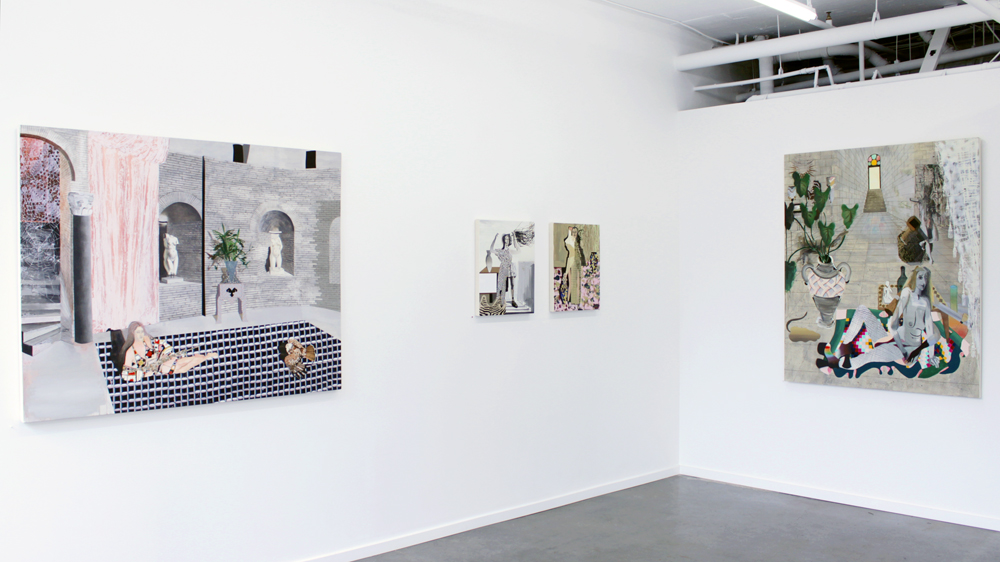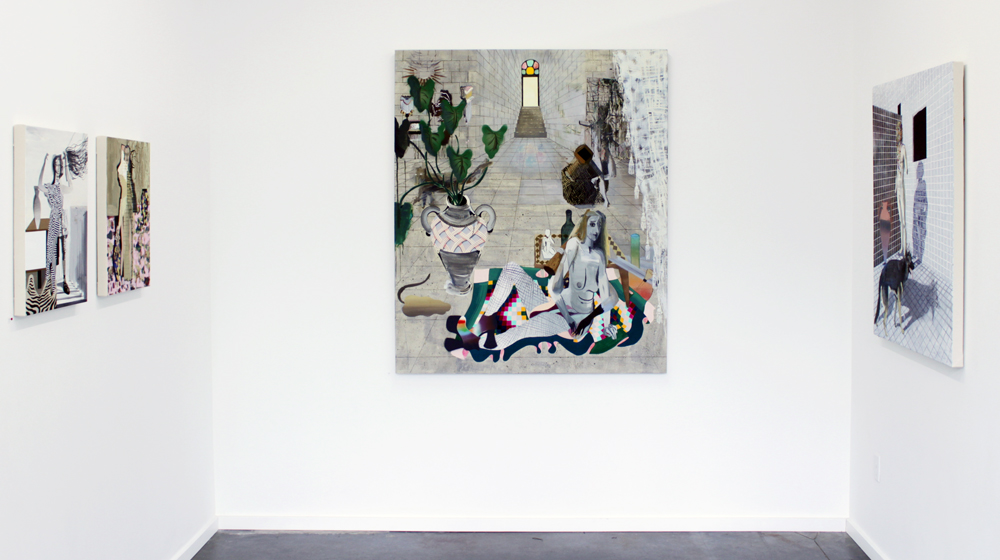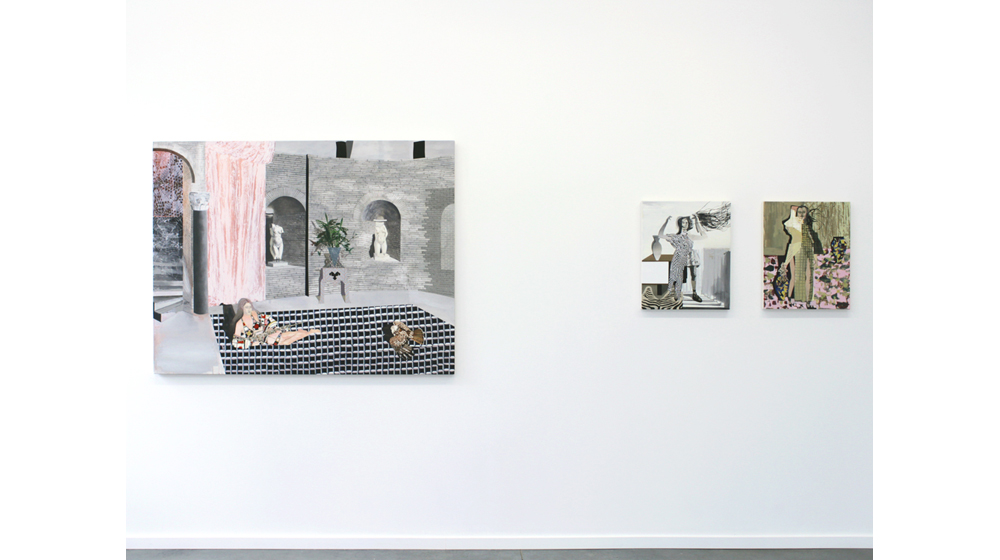ELIZABETH MALASKA // when we dead awaken II
On view September 1–October 10, 2016
Opening reception Sunday, September 4 (3–6PM)
While contemporary media’s blatant objectification of the female form remains a constant narrative within feminist debate, the history of the male gaze courses deep. The passive poses and bare skin seen routinely on billboards and television is only a reworking of the supine nudes favored for centuries by male painters and their male patrons. From Titian’s Venus of Urbino, to Ingres’ Grande Odalisque, to Picasso’s Les Demoiselles d’Avignon, Western art history continuously casts the female form as a talisman for brazen voyeurism. Building on the critical examination of this trajectory, and its malnourishing effect upon women’s psyches as displayed in her 2014 solo exhibition at Nationale, painter Elizabeth Malaska’s show, When We Dead Awaken II, utilizes abrupt shifts of style to further heighten awareness of the act of viewing and, to a larger extent, the global culture of patriarchal aggression. Malaska’s army of female subjects may, at first, lure the eye with their windswept hair and curvaceous silhouettes. However, their direct gazes and militant stances, amidst dreamlike backdrops of the familiar gone askew, disrupt and complicate superficial attempts at viewing pleasure.
Borrowing select strategies from various painterly traditions, Malaska foregrounds this critical study on a unique aesthetic of illogical pastiche. The realism and one-point perspectives of Neo-Classicism merge abruptly with both the spatial distortions and symbolism of Surrealism and the geometrics and collaged patterns of Modernism. Her palette is a similarly clunky clashing of corporal pinks, drab greys, and aggressive neon, while her paint strokes transition rapidly between spray-painted shading and opaque coloring. The result is immediately disconcerting, especially when applied towards such uncanny subject matter.
While often mimicking the suggestive poses of classic female nudes, Malaska’s women are anything but agreeable objects. Sustaining the hyperawareness of Manet’s shocking Olympia, they stare boldly from the canvas, catching the viewer’s gaze and intimidating any unsavory intentions. Their ominous surroundings only heighten this undercurrent of power and aggression. One woman lies seductively upon a void-like patterning of digital chains within a Roman ruin. The gun held confidently in her hands instantly belies her seductive pose, while a nearby hawk hints at stranger powers. Another figure hovers uneasily above a quilt’s cutesy hearts and patchwork design. She is neither resting nor active but, perhaps, caught in between. Her arms are posed defensively, hands rolled into the tight fists of revolutionary fervor. Maybe she was once part of a dream—a beautiful woman submissively lying within a strange beach dreamscape, her folded peach skirt hinting at another’s desire. Then there was a rupture, a visible crack in the scene. She, now conscious, is no longer content with her previous role.
Malaska tears open Western art history’s tradition of sexism and forces the viewer to consume that which is more easily ignored. This disturbance of a predatory gaze ultimately reveals an even more essential truth: what we reject out of fear is inextricably linked to our subconscious desire, and only if we accept this dichotomy will we live a more whole existence.
This exhibition and the accompanying catalog were supported by generous grants from the Regional Arts & Culture Council and the Oregon Arts Commission.
Born in Portland, OR, Elizabeth Malaska earned her MFA from the city’s Pacific Northwest College of Art (PNCA). Her work has been exhibited nationally at various institutions including Portland’s Nationale, Froelick Gallery, Disjecta Contemporary Art Center, Portland Center Stage, University of Oregon’s White Box gallery, and San Francisco’s California College of the Arts, where she also received her BFA. She was named a finalist for The Joan Mitchell Foundation MFA Grant and the Fine Arts Work Center fellowship in Provincetown, MA. Malaska received support from the Barbara Deming Memorial Fund in 2015 and a Project Grant from the Regional Arts & Culture Council in 2016. Most recently, she was honored with a 2016 Individual Artist Fellowship through the Oregon Arts Commission. She has lectured, taught, and mentored at PNCA, Oregon College of Art and Craft, and Eastern Oregon University. Malaska lives and works in Portland, OR.
PRESS & MORE
Unbecoming Women: Elizabeth Malaska’s When We Dead Awaken II by Sarah Sentilles (also published on Ms. Magazine, October 5, 2016)
The Best of a Bad Situation, exhibition review by Patrick Collier, Oregon ArtsWatch, September 13, 2016
Arts Best Bets, The Oregonian, September 2, 2016
Fall Arts Guide, The Portland Mercury, August 31, 2016
ART21 Instagram pick, September 2, 2016
Jennifer Rabin's Picks, The Willamette Week, September 28, 2016
IMAGES
To request a price list for this exhibition, please email info@nationale.us













